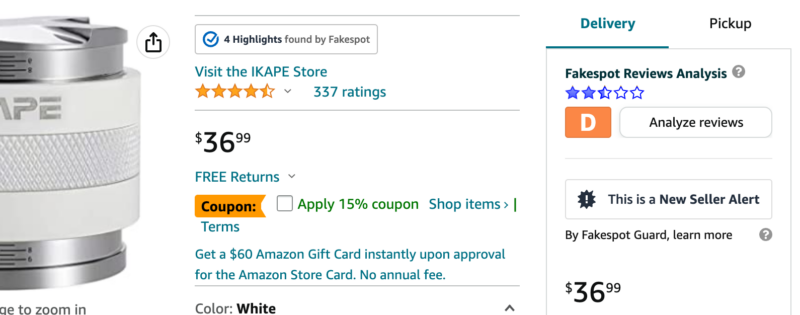
Fakespot, a useful service that explains how products you've never heard of could have 12,000 reviews with a 4.6-star average, has been acquired by Firefox-maker Mozilla, and Mozilla plans to integrate it into Firefox.
"We are joining a company that develops one of the most popular browsers in the world in Firefox with a lineage that dates back to the origins of the Internet," writes Saoud Khalifah, founder of Fakespot, on the company's site. "In Mozilla, we have found a partner that shares a similar mission as to what the future of the internet should look like, where the convergence of trust, privacy, and security play an imperative part of our digital experiences."
Mozilla acquired the article-saving tool Pocket (formerly Read It Later) in February 2017 but had already integrated its extension directly into Firefox. Pocket was a key piece of what Mozilla calls its Context Graph, a kind of human-powered web discovery and understanding system. It's easy to see Fakespot as part of that.
Mozilla also wants to expand its "work around ethical AI and responsible advertising," according to Steven Teixeira, chief product officer, in a blog post. Teixeira notes that people return fake and juked-up products less often, so "the environment benefits from a reduction in packaging and shipping." Fakespot will be worked into Firefox "over time," the post claims.
After you install Fakespot's extension for Chrome, Firefox, iOS, or Android, it changes the makeup of product pages on Amazon, eBay, Sephora, Shopify, and other e-commerce sites. Fakespot will run through a product's reviews and then the history of those reviewers, using AI to search for common patterns of paid, astroturf, or other imposter behavior (as Fakespot told Wirecutter's Lauren Dragan in 2016). The reviews then get a letter grade and a "corrected" average score based on the reviews not cited as fake. Fakespot's FAQ section doesn't get much more specific, only noting that it uses "artificial intelligence that has been trained to pick up on patterns" and doesn't reveal its methods to avoid scammers dodging its tools.
For one espresso distributor and tamper product I (algorithmically) stumbled across, Fakespot gave the reviews a D and suggested that, rather than the 4.6 out of 5 average cited across 337 reviews, it was more like a 2.5 average. The full report states that Fakespot's engine saw "high deception" across reviewer patterns and that only 58.5 percent of the reviews are reliable.
Fakespot will not lose its Chrome, iOS, or Android versions, and Mozilla claims it will be "continuing to enhance the Fakespot experience" for all users. But there will be unique Firefox integrations, making those users "the best equipped to cut through deceptive reviews," Mozilla's Teixeira wrote.
Listing image by Fakespot
reader comments
61